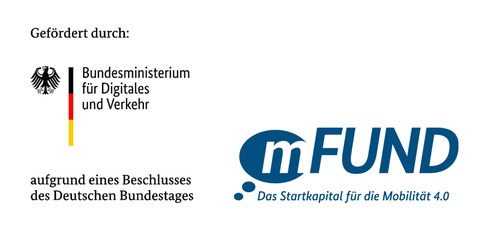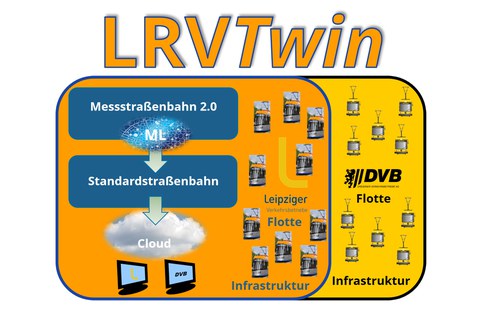LRVTwin - A digital twin for light rail vehicles
Content

Fördergeber und Förderprogramm
Reliable operation of a light rail vehicle fleet requires knowledge of the condition of the rail and track. Automated collection of this information does not currently occur. Random surveys and deadline-based maintenance lead to inaccurate information and considerable cost expenditures. The evaluation of this information currently allows only inadequate statements to be made because suitable correlation methods and analysis procedures are lacking.
The focus is on the development of methods for the reconstruction of signals with high information content from easily accessible measured variables. Machine learning allows the establishment of such complex correlations based on large amounts of data. These data are generated by a measurement tramcar 2.0. Data processing and information provision are addressed. Knowleges regarding tramcar and track condition are provided and visualized for an optimized fleet management.
Objectives
The aim of the project is to increase the availability of a tramcar fleet by evaluating standard sensors that are available in every tramcar. Insights into the condition of tramcar and track enable target-oriented fleet usage and reduce follow-up maintenance costs. The increase in rail reliability increases the acceptance of public transport among the population. Financial advantages arise for operators and users.
Benefits
The result is a best-practice example of a digitized tramcar fleet with increased availability and optimized maintenance. Reduced costs are passed on to customers. An increase in the attractiveness of public transport can be expected. Tramcar and network status are available digitally and will be extended from the individual tram to the digital fleet. The transferability is demonstrated on two networks in Leipzig and Dresden. The extension to other cities and means of transport is expected in the future.
Project Management
 © TU Dresden
© TU Dresden
Dr.-Ing. Peter Hantschke
Send encrypted email via the SecureMail portal (for TUD external users only).
Chair of Computational and Experimental Solid Mechanics
Visiting address:
MAR30, Zimmer 056 Marschnerstraße 30
01307 Dresden
Project Employee
 © TU Dresden
© TU Dresden
Dipl.-Ing. Leonhard Heindel
Send encrypted email via the SecureMail portal (for TUD external users only).
Chair of Computational and Experimental Solid Mechanics
Visiting address:
MAR30, Zimmer 056 Marschnerstraße 30
01307 Dresden

